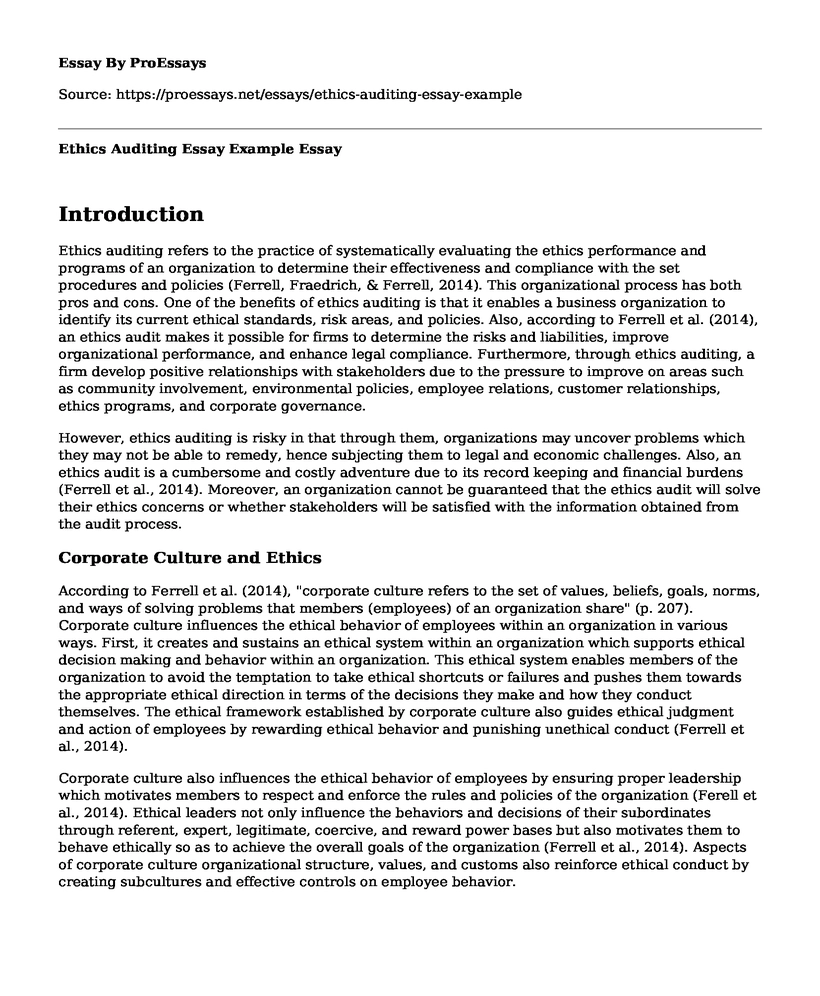Introduction
Ethics auditing refers to the practice of systematically evaluating the ethics performance and programs of an organization to determine their effectiveness and compliance with the set procedures and policies (Ferrell, Fraedrich, & Ferrell, 2014). This organizational process has both pros and cons. One of the benefits of ethics auditing is that it enables a business organization to identify its current ethical standards, risk areas, and policies. Also, according to Ferrell et al. (2014), an ethics audit makes it possible for firms to determine the risks and liabilities, improve organizational performance, and enhance legal compliance. Furthermore, through ethics auditing, a firm develop positive relationships with stakeholders due to the pressure to improve on areas such as community involvement, environmental policies, employee relations, customer relationships, ethics programs, and corporate governance.
However, ethics auditing is risky in that through them, organizations may uncover problems which they may not be able to remedy, hence subjecting them to legal and economic challenges. Also, an ethics audit is a cumbersome and costly adventure due to its record keeping and financial burdens (Ferrell et al., 2014). Moreover, an organization cannot be guaranteed that the ethics audit will solve their ethics concerns or whether stakeholders will be satisfied with the information obtained from the audit process.
Corporate Culture and Ethics
According to Ferrell et al. (2014), "corporate culture refers to the set of values, beliefs, goals, norms, and ways of solving problems that members (employees) of an organization share" (p. 207). Corporate culture influences the ethical behavior of employees within an organization in various ways. First, it creates and sustains an ethical system within an organization which supports ethical decision making and behavior within an organization. This ethical system enables members of the organization to avoid the temptation to take ethical shortcuts or failures and pushes them towards the appropriate ethical direction in terms of the decisions they make and how they conduct themselves. The ethical framework established by corporate culture also guides ethical judgment and action of employees by rewarding ethical behavior and punishing unethical conduct (Ferrell et al., 2014).
Corporate culture also influences the ethical behavior of employees by ensuring proper leadership which motivates members to respect and enforce the rules and policies of the organization (Ferell et al., 2014). Ethical leaders not only influence the behaviors and decisions of their subordinates through referent, expert, legitimate, coercive, and reward power bases but also motivates them to behave ethically so as to achieve the overall goals of the organization (Ferrell et al., 2014). Aspects of corporate culture organizational structure, values, and customs also reinforce ethical conduct by creating subcultures and effective controls on employee behavior.
Reference
Ferrell, O.C., Fraedrich, J, Ferrell, L. (2014). Business ethics: Ethical decision-making andcases, tenth edition. Stamford, CT: Cengage Learning
Cite this page
Ethics Auditing Essay Example. (2022, Oct 20). Retrieved from https://proessays.net/essays/ethics-auditing-essay-example
If you are the original author of this essay and no longer wish to have it published on the ProEssays website, please click below to request its removal:
- Paper Example on Objectivity Versus Relativity
- The Future of Nursing: Leading Change, Advancing Health Essay
- Ageism in the Health Sector Paper Example
- Reconceptualising How the Boko Haram Operates Paper Example
- Essay Sample on Manpower Selection: Crucial for Project Success
- Essay Example on High-Performance Team Leadership in Nursing Environment
- Paper Example on Strategic Change Management: Vital Role for Org Success & Realizing Goals







